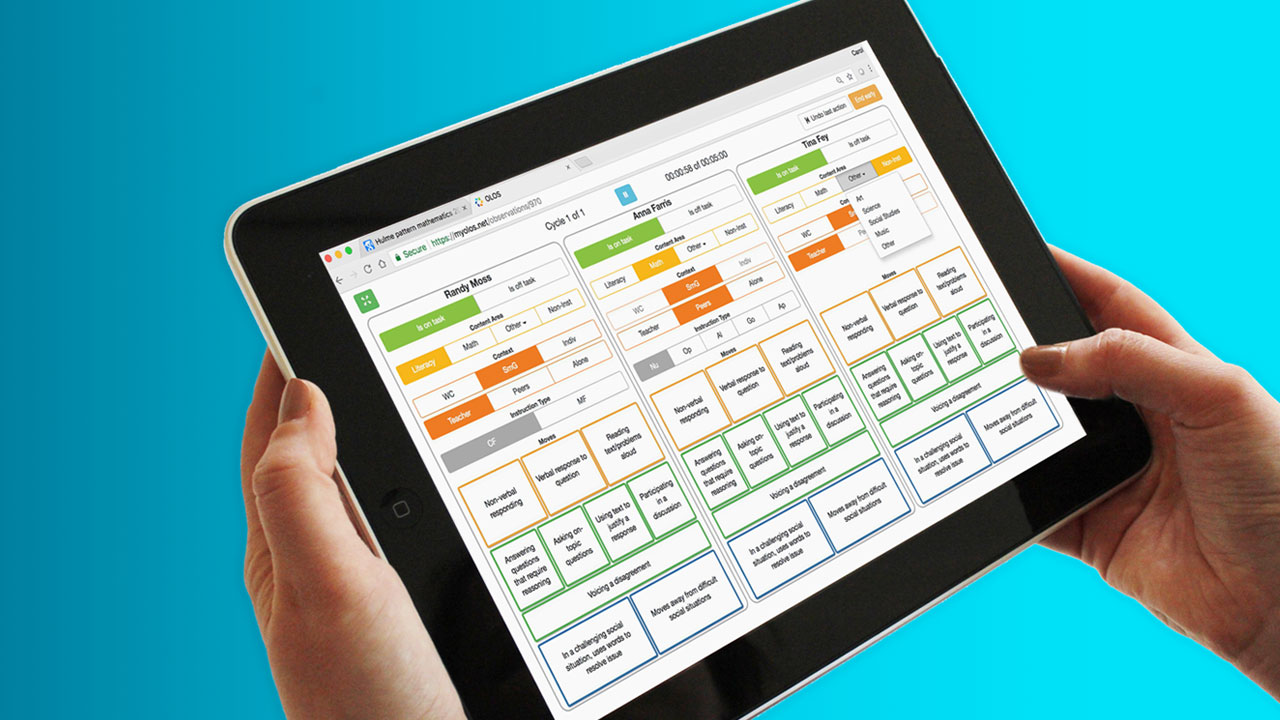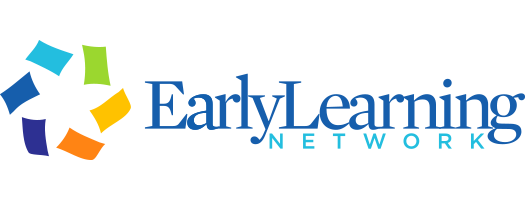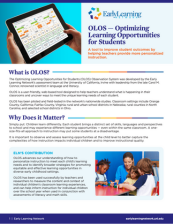
30 Nov OLOS tool supports individualized assessment and instruction for early learning success
The OLOS tool addresses the need for a comprehensive, multidimensional assessment tool to support individualized instruction from pre-K through the early elementary grades.
One of the most exciting products generated and refined through the Early Learning Network studies is a web-based classroom assessment tool known as OLOS — the Optimizing Learning Opportunities for Students Observation System. The OLOS tool focuses on improving student outcomes by providing teachers with real-time data to support individualized assessment and instruction.
The network’s collective findings associated with the OLOS tool are outlined in a recent brief, and summarized below, which may help inform practice and policy decisions that support equitable and effective learning opportunities for children.
Research Highlights
Optimizing Learning Opportunities for Students
What is OLOS?
OLOS is a user-friendly, web-based tool designed to be used by teachers to help them better understand what is happening in their classrooms and uncover ways to meet the unique learning needs of each student. OLOS also can be used by researchers to measure individual students’ experiences in their classrooms.
How does OLOS work?
An observer uses the OLOS tool to capture the classroom experiences of individual children within the same classroom, including data on literacy and mathematics instruction, teacher-child interactions and the classroom learning environment. In real time, the system generates reports that provide teachers with recommended instructional practices based on classroom observations to meet individual student learning needs.
Watch an OLOS presentation and demonstration led by Ashley Sanabria, OLOS researcher and assistant professor of speech, language and hearing sciences at San Diego State University.
Who created OLOS?
The OLOS tool was developed by the network’s assessment team at the University of California, Irvine with leadership from the late Carol M. Connor, renowned scientist in language and literacy. It was piloted and field-tested in classrooms across the U.S. in partnership with other network members. Classroom settings include Orange County, California; Fairfax County, Virginia; rural and urban school districts in Nebraska; rural counties in North Carolina; and selected school districts in Ohio.
Why does OLOS matter?
Individualized instruction is key to student success. Each student brings a distinct set of skills, languages and perspectives to school and may experience different learning opportunities — even within the same classroom. Importantly, a one size-fits-all approach to instruction may put some students at a disadvantage. Some students might need more one-on-one direct instruction while others need more practice opportunities.
The OLOS tool can help teachers and researchers observe and assess learning opportunities for each child in their classroom to understand how instruction impacts individual children and to use that information to improve instructional quality.
“The technology shows great promise for improving our ability to ensure all children receive instruction that is aligned with what they need,” said Deborah Vandell, principal investigator, University of California, Irvine.
What has OLOS contributed to the field?
The OLOS tool advances the field’s understanding of how to tailor instruction to meet each child’s learning needs and to identify broader strategies for promoting equitable and effective learning opportunities in diverse early childhood settings when used in conjunction with assessments of literacy and math skills.
“The OLOS observation system meets the critical need for a more comprehensive, multidimensional assessment in early childhood education — one that covers structural features, classroom processes and instructional quality across content areas linked to child outcomes in the early learning years,” Vandell said.
Findings
What did the network learn?
Research conducted by network teams uncovered the following general instructional practices in pre-K through third grade classrooms, and their association with children’s literacy and math performance.
*Literacy findings:
- Children’s literacy growth was observed when recommended letter instruction matched children’s skills; however, minimal instructional time was spent on letter learning, with a decline from pre-K to third grade.
- Meaning-focused instruction positively impacted children’s vocabulary. Exceeding recommended meaning-focused instruction led to higher gains.
*Findings apply to pre-K only
Math findings:
- Math experiences looked very different between pre-K and kindergarten, with kindergarten featuring more mixed learning opportunities, including whole class, small group and individual activities led by both teachers and students.
- In kindergarten, math instruction was linked to growth, especially for children with low math skills.
- Whole class math experiences in kindergarten were associated with lower math gains, especially for low-skilled children. Individual math activities in kindergarten were linked to higher gains for kindergarteners with low math skills.
Classroom use findings:
- Teachers can effectively use the OLOS system after online or in-person training.
- The OLOS system, particularly its online dashboard, was valued by teachers for its immediate impact on instruction.
These findings underscore the importance of individualized instruction and meaningful engagement, especially in literacy and math, to close opportunity gaps and help children maintain early learning success.
“We are really proud of the network’s OLOS work, and its potential to empower teachers to provide targeted and effective learning experiences by deepening their understanding of students’ learning needs and where they might need additional support,” Sanabria said.
Interested in learning more?
To learn more about OLOS and how it can benefit your school or program, please contact:
Deborah Vandell, Ph.D., Principal Investigator
Early Learning Network Assessment Team
University of California, Irvine



